#ca foundation law chapter 1 revision
Explore tagged Tumblr posts
Text
What is good to do for a Chartered Accountant after the 12th exam? Students are confused about taking B.Com or taking the road of C.A. directly?
Charting Your Course: When to Begin Your CA Journey?
The esteemed profession of chartered accountant (CA) beckons many aspiring individuals. It promises a diverse range of job opportunities and a well-paying career, making it a popular choice among students.

Not Be confused about choosing a way to take CA
But a crucial question often arises: when to embark on this path?
Should you start right after high school (12th grade) or pursue a Bachelor of Commerce (B.Com.) first?
After your 12th board examination in India, preparing for the Chartered Accountant (CA) exams is a challenging but lucrative road. A diligent study plan, dedication, and concentration are required to become a chartered accountant.
Yes, CA is indeed a very tough path, but it is not impossible to play chess and become a CA. The thorough handbook or study notes will help prospective CAs with their preparation. Nowadays, millions of online study materials are available for free to learn, including CA online coaching classes on the YouTube platform:
The answer, like most things in life, depends on your unique goals and preferences.
Starting after 12th:
Early Start, Early Finish: You get a head start on your CA journey, allowing you to qualify and enter the workforce sooner.
Streamlined Studies: The foundation course for CA, previously known as the Common Proficiency Test (CPT), can be taken right after the 12th. This allows you to integrate CA studies with your undergraduate courses if you choose to pursue one concurrently.
Starting after B.Com:
Strong Foundation: A, B.Com. degree equips you with a solid grounding in commerce and accounting principles, which can prove invaluable during your CA studies.
Master's Degree Option: If you have your sights set on a Master's in Commerce or a related field, completing your B.Com first provides a strong academic base.
The Bottom Line: It's All About You
Ultimately, the decision about when to pursue CA hinges on your aspirations and circumstances. Carefully weigh your options and seek guidance from professionals in the field before making a choice.
Ready to Dive Deeper?
If you're eager to learn more about the CA journey and the exciting career avenues it opens, explore our comprehensive guide (link in bio, if applicable) for a detailed roadmap to becoming a Chartered Accountant.
9 Tips to Overcome Your Fear of the CA Exam

Quitely Understand the Exam Structure: Become acquainted with the subjects, question patterns, and grading system of the CA exam, which includes the final CA exam, the IPCC (Integrated Professional Competence Course), and the CPT (Common Proficiency Test).
Carefully Join a trusted CA online coaching institute (should be online or offline): Make sure the coaching institute you select offers thorough study materials, professional advice, and a well-organized study schedule.
Organizations such as the Institute of Chartered Accountants of India (ICAI) offer guidance and materials to help students get ready.
Schedule a timetable: Create a study plan that addresses each subject in detail. Give each subject adequate attention, taking into account both your level of expertise and the subject's intricacy.
Examining yourself daily is a multivitamin for you. (Regular Practices): To become more familiar with the steps of the exam and improve your ability to organize your time, solve practice questions, mock tests, and pass papers frequently for at least 10 years.
Attention on Theoretical Clarity: Instead of rote memorization, passing the CA exam requires a thorough or solid understanding of the subject matter. Give careful attention to comprehending the fundamental ideas and how they are used in actual situations.
Get Tips for Success: Don't be afraid or hesitate to ask seasoned instructors, fellow students, or mentors for advice. Clarification of ambiguities (doubts) and questions facilitates understanding.
Keep Up with Keep up with important events, revisions, and shifts in accounting rules because these will frequently be covered in the test.
Reviewing the syllabus is important as well: It is essential to regularly review all subjects. Plan time for review in your studies to ensure that you comprehend the material.
Read Also: Syllabus of ICAI CA Foundation Exam 2024: Exam Date, Marks
Maintaining health is good for you: Learning effectively requires not only intense study sessions but also regular breaks, rest periods, and a healthy balance between work and play.
Making an informed choice of the best training institute can be aided by investigating several coaching centers, their success rates, faculty expertise, study materials, and alumni reviews. In addition, organizations like Wisdom Academy - one of the renowned coaching centers—offer CA candidates high-quality instruction and direction. You are free to approach them at any time. outstanding performance on your CA online test.
Remember that passing the #CA examinations require not simply effort but also a planned and methodical CA study strategy. Aspiring CPAs may pass these tests and have a bright future in finance and accounting with hard work and devotion; programs like Wisdom Academy just move you one step closer to realizing your potential.
All the best… "If you want to shine like a sun, first burn like a sun." - Shri Abdul Kalam
#quantitative aptitude for ca#ca final important questions#icai important announcement#success series online classes#ca final standards#ca foundation law chapter 1 revision#ca final exam postpone#icai exam tips session#best test series for ca final#ca inter audit expected questions#best ca online coaching classes#ca intermediate rank preparation
1 note
·
View note
Text
Top Study Hacks for CA Students: Learn Smarter, Not Harder

Preparing for Chartered Accountancy (CA) exams can be overwhelming. With extensive syllabi and challenging concepts, students often find themselves buried under books. But what if you could learn smarter, not harder? This blog shares top study hacks tailored for CA students, helping you optimize your preparation for CA Foundation Classes, CA Inter Classes, and even Online CA Courses in India.
Let’s dive into strategies that ensure effective learning while managing your time wisely.
1. Understand the CA Curriculum Thoroughly
Before starting your preparation, ensure you have a clear understanding of the syllabus for your respective level—be it CA Foundation, Intermediate, or Final. Use the official ICAI study material as your guide and refer to structured resources from reputed CA Coaching Classes.
Pro Tip: Divide the syllabus into manageable chunks and set deadlines for completing each section.
2. Leverage Technology with Online CA Courses
The shift towards Online CA Courses in India has made high-quality education accessible from anywhere. These courses allow flexibility in scheduling and often come with recorded lectures for revision.
Enrolling in platforms like Swapnil Patni Classes can give you access to experienced faculty, comprehensive study materials, and mock tests that replicate the real exam environment.
3. Adopt Active Learning Techniques
Passive reading or rote memorization won’t take you far in CA preparation. Instead, focus on active learning methods:
Make Notes: Write your own summary of each chapter.
Teach Back: Try explaining concepts to a friend or family member.
Practice Problems: Apply concepts through practical problems daily.
4. Follow the Pomodoro Technique for Study Sessions
Staying focused for long hours can be tough. The Pomodoro Technique helps break your study time into intervals, typically 25 minutes of focused work followed by a 5-minute break.
How it helps: It prevents burnout and improves concentration, making your CA Inter Classes or Foundation studies more productive.
5. Master Time Management with Timetables
Having a structured timetable is key for CA students. Allocate time for each subject, keeping in mind the weightage and difficulty level. Also, schedule periodic revisions to retain what you’ve studied.
For example:
Morning: Study theory-heavy subjects like Law.
Afternoon: Focus on practical subjects like Accounts or Taxation.
Evening: Revise and practice multiple-choice questions (MCQs).
6. Utilize Mock Tests and Past Papers
Mock tests and previous year papers are indispensable tools for CA exam preparation. They help you get accustomed to the exam pattern and time management.
Pro Tip: Attempt mock tests under exam-like conditions. Analyze your mistakes and revise the weaker areas immediately.
7. Stay Consistent and Avoid Procrastination
Consistency is crucial in CA preparation. Avoid the trap of last-minute cramming by studying daily. Small, consistent efforts are more effective than sporadic study marathons.
Enrolling in structured CA Classes in India can help maintain this consistency, as scheduled sessions keep you on track.
8. Attend to your mental and physical well-being.
A healthy mind resides in a healthy body. Incorporate regular exercise, meditation, or yoga into your routine to reduce stress. Get 7-8 hours of sleep daily, as a well-rested brain absorbs information better.
9. Focus on Conceptual Clarity
CA exams are designed to test your understanding, not just your memorization skills. Prioritize conceptual clarity over rote learning. Quality CA Foundation Classes and CA Inter Classes, like those offered by Swapnil Patni, can provide in-depth explanations and real-world examples.
10. Stay Motivated and Positive
CA preparation is a marathon, not a sprint. Maintain your motivation by establishing short-term objectives and rewarding yourself when you reach them. Surround yourself with positive influences, such as supportive peers or mentors from your CA Coaching Classes.
"Success is the sum of small efforts, repeated day in and day out," is a quote to keep in mind.

Why Choose Swapnil Patni Classes for CA Preparation?
At Swapnil Patni Classes, we understand the challenges faced by CA students. Our CA Foundation, CA Inter, and Final classes, available online and offline, are designed to provide:
Expert guidance from industry-leading faculty.
Comprehensive study material and regular assessments.
Flexibility with online courses for students across India.
By implementing these study hacks, you can transform your preparation strategy, ensuring you are exam-ready while maintaining a healthy balance in life. Remember, smart preparation is your pathway to becoming a successful Chartered Accountant.
Start your journey with Swapnil Patni Classes today and give your CA dreams the best chance of success!
Ready to ace your CA exams? Explore our courses at www.swapnilpatni.com to kickstart your preparation journey.
#ca classes in india#ca coaching classes#ca foundation classes#ca inter classes#online ca course in india#ca live classes
0 notes
Text
CA Exams: How to Overcome Procrastination and Build Productive Study Habits.

Preparing for the CA exams is a challenging journey that requires consistent effort, discipline, and focus. However, one of the biggest hurdles many aspirants face is procrastination. Putting off study sessions or avoiding difficult tasks can severely hinder progress. To successfully navigate through this, it’s essential to adopt effective study habits and create a structured routine. This article will guide you on how to overcome procrastination and build productive study habits to excel in your CA exams, incorporating helpful tools like CA Entrance Exam Books, Scanner CA Foundation Books, Scanner CA Intermediate Books, and Scanner CA Final Books.
The Importance of Overcoming Procrastination
Procrastination is a common issue among CA aspirants. With the vast syllabus and complex topics, it’s easy to delay studying or tackle more manageable tasks first. However, procrastination leads to last-minute cramming, increased stress, and reduced retention. Overcoming procrastination involves recognizing its causes and implementing strategies to stay disciplined and focused throughout your study routine.
Step 1: Break Down Your Study Sessions into Manageable Chunks
The first step in overcoming procrastination is breaking your study sessions into smaller, manageable chunks. Attempting to study for long hours without a break can feel overwhelming and lead to procrastination. Instead, use techniques like the Pomodoro Technique, where you study for 25 minutes and take a 5-minute break, or break your study material into specific topics and allocate time accordingly.
Start by referring to the syllabus for CA Entrance Exam Books and outline which chapters need to be tackled first. Once you know your goals, break down the syllabus into daily tasks. For example, if you're studying for the CA Foundation, set small goals like “Complete Chapter 1 of Financial Accounting” rather than “Study Accounting.”
This approach prevents feeling overwhelmed and helps you maintain focus on completing smaller, achievable tasks.
Step 2: Create a Structured Study Plan
Having a well-organized study plan is key to avoiding procrastination. A study plan helps allocate enough time for every subject, and it provides you with a roadmap to follow each day. Begin by scheduling your day, ensuring that you dedicate adequate time for each subject, taking into account the difficulty and weightage of topics.
For instance, if you're preparing for CA Foundation, use Scanner CA Foundation Books to identify frequently asked topics and allocate more time to them. Similarly, for CA Intermediate, use Scanner CA Intermediate Books to guide your revision strategy.
Here’s a simple outline for creating a productive study plan:
Morning: Dedicate time to difficult subjects like Audit or Taxation.
Afternoon: Focus on subjects that need practice, such as Financial Management.
Evening: Revise theory-heavy subjects, like Accounting or Law.
Remember to allow time for breaks and ensure that your schedule includes a buffer period for unforeseen delays.
Step 3: Use CA Scanners Effectively for Targeted Revision
One of the most efficient ways to avoid procrastination is to use study materials that help you focus on high-priority areas. Scanner CA Foundation, Scanner CA Intermediate, and Scanner CA Final scanners are invaluable tools for identifying important topics and frequently asked questions.
These scanners help you to prioritize your revision, ensuring that you're focusing on key concepts that have appeared in past exams. Rather than aimlessly going through your books, use the Scanner CA Foundation Books and Scanner CA Intermediate Books to refine your study approach, working through practice problems and mock exams in the scanner. These books provide a roadmap for your revision and will help you stay on track during your study sessions.
CA Foundation Scanner: Helps you focus on essential questions and topics in each subject.
CA Intermediate Scanner: Highlights key topics and previous-year questions, helping you strategize your revision effectively.
CA Final Scanner: Includes comprehensive questions that target exam trends and provide a strong foundation for your final revision.
By working through these scanners, you'll feel more confident and prepared, reducing the temptation to procrastinate.
Step 4: Minimize Distractions and Stay Focused
One of the primary reasons for procrastination is the constant presence of distractions—whether it’s your phone, social media, or family members. It’s essential to create a distraction-free study environment to improve focus.
Here are a few tips to minimize distractions:
Designate a study space: Choose a quiet, comfortable spot where you can focus entirely on studying.
Turn off notifications: Switch off your phone or use apps that block distractions during study time.
Set clear goals for each session: Define what you want to accomplish before you start each study session. This helps you stay on track and discourages procrastination.
Step 5: Track Your Progress and Celebrate Small Wins
Tracking your progress is crucial in building productive study habits. Use a study journal or a digital planner to monitor what you've studied each day and how much you’ve accomplished. Tracking your progress helps you recognize patterns in your study habits and provides motivation.
Celebrate small wins—completing a chapter, solving a challenging problem, or finishing a mock exam—will keep you motivated and reinforce positive habits. Remember that progress, no matter how small, is still progress.
Step 6: Take Care of Your Well-Being
A major cause of procrastination is stress and burnout. It’s essential to balance study with self-care. Ensure you get enough sleep, exercise regularly, and eat nutritious food to keep your energy levels high.
When you’re mentally and physically healthy, you’ll find it easier to stay focused and avoid procrastination. Take time for breaks and hobbies to recharge your mind, allowing you to study more effectively when you return to your books.
Conclusion
Overcoming procrastination and building productive study habits for the CA exams requires discipline, focus, and the right resources. Use tools like Scanner CA Foundation Books, Scanner CA Intermediate Books, and Scanner CA Final Books to prioritize key topics and guide your revision strategy. A structured study plan, breaking down tasks into smaller goals, and minimizing distractions will also help you stay on track and avoid procrastination.
Remember, consistency is key. By following these steps and maintaining a balanced routine, you can build productive study habits that will help you excel in your CA exams and achieve success. Stay focused, stick to your plan, and you'll see the results in your performance.
0 notes
Text
Step by Step: Achieving Success in CA Intermediate
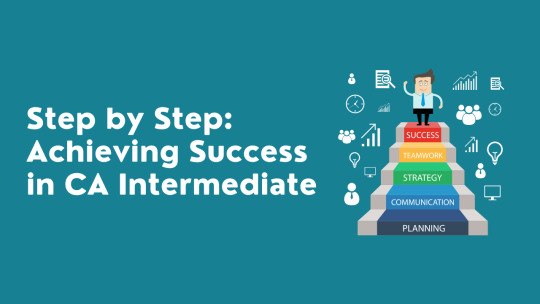
The Chartered Accountancy (CA) Intermediate exam is a crucial milestone for aspiring accountants. Success in this exam requires strategic planning, disciplined study habits, and a deep understanding of the subject matter. Here’s a step-by-step guide to help you navigate this journey and achieve success in your CA Intermediate exams.
1. Understand the CA Intermediate Structure
The first step to success is understanding the structure of the CA Intermediate exam. It consists of two groups, each containing four papers. Group 1 covers Accounting, Corporate and Other Laws, Cost and Management Accounting, and Taxation. Group 2 includes Advanced Accounting, Auditing and Assurance, Enterprise Information Systems & Strategic Management, and Financial Management & Economics for Finance. Knowing the syllabus, the weightage of topics, and the type of questions asked is crucial for effective preparation.
To effectively prepare, it's crucial to know the syllabus, the weightage of topics, and the type of questions asked. One valuable resource for this is the Scanner CA Intermediate Books. These books compile previous years' exam questions topic-wise, helping you understand the exam pattern and the frequency of specific questions.
2. Create a Realistic Study Plan
A well-structured study plan is the backbone of your preparation. Start by allocating time to each subject based on its difficulty level and your proficiency. Make sure your plan covers the entire syllabus and leaves ample time for revision. Break down your daily goals into smaller, manageable tasks. This will help you stay focused and maintain a steady pace throughout your preparation.
3. Prioritize Conceptual Clarity
CA Intermediate exams prioritize your understanding of concepts over rote learning. To excel, it’s essential to build a strong foundation in each subject. One effective tool to aid your preparation is the CA Intermediate Scanner. This resource compiles past exam questions, organized by chapter and topic, giving you insight into how concepts are tested. By working through the scanner, you can identify important topics and understand the types of questions that commonly appear.
4. Practice Regularly
Practice is the key to mastering CA Intermediate. Solving past exam papers, mock tests, and sample questions is essential. This will not only help you familiarize yourself with the exam pattern but also improve your time management skills. Regular practice helps in identifying weak areas, allowing you to focus on them during revisions.
5. Revise Strategically
Revision is crucial for consolidating your knowledge. Start your revision early, preferably a few months before the exam. During this phase, focus on revising concepts, practicing key problems, and memorizing important sections and provisions. Make use of summary notes, flashcards, and mind maps for quick revisions. Utilize Books for CA Exam as essential resources for in-depth study and problem-solving practice. Group revisions can also be beneficial, as discussing topics with peers can reinforce your understanding.
6. Stay Updated with Amendments
The syllabus for CA Intermediate, especially in subjects like Taxation and Law, is subject to frequent changes and amendments. Stay updated with the latest amendments through ICAI notifications, study material, and other reliable sources. Incorporate these changes into your study plan to avoid any last-minute surprises.
7. Manage Stress and Stay Positive
Preparing for CA Intermediate can be stressful, but managing stress is vital for success. One effective way to alleviate stress is by using the right study material for CA. High-quality study resources provide clarity and help streamline your preparation process, reducing anxiety about the vast syllabus. Alongside this, it's important to take regular breaks, engage in physical activities, and practice relaxation techniques like meditation.
8. Prepare for the Exam Day
Finally, ensure that you’re well-prepared for the exam day. Get a good night's sleep before the exam, and reach the exam center early. Keep all necessary documents and stationery ready the night before. Read the questions carefully during the exam, and manage your time effectively. Attempt the questions you’re confident about first, and don’t spend too much time on difficult ones.
Conclusion
Achieving success in CA Intermediate requires a combination of hard work, smart study techniques, and a positive mindset. Utilizing resources like CA Entrance Exam Books can significantly enhance your preparation by providing comprehensive coverage of essential topics and practice questions. By following this step-by-step guide, you can approach your exams with confidence and set yourself on the path to becoming a successful Chartered Accountant. Remember, persistence and determination are the keys to unlocking your potential and achieving your goals in this challenging but rewarding journey.
#books for ca exam#ca entrance exam books#ca intermediate scanner#study material for ca#scanner ca intermediate books#scanner ca foundation books
0 notes
Text
Step by Step: Achieving Success in CA Intermediate

The Chartered Accountancy (CA) Intermediate exam is a crucial milestone for aspiring accountants. Success in this exam requires strategic planning, disciplined study habits, and a deep understanding of the subject matter. Here’s a step-by-step guide to help you navigate this journey and achieve success in your CA Intermediate exams.
1. Understand the CA Intermediate Structure
The first step to success is understanding the structure of the CA Intermediate exam. It consists of two groups, each containing four papers. Group 1 covers Accounting, Corporate and Other Laws, Cost and Management Accounting, and Taxation. Group 2 includes Advanced Accounting, Auditing and Assurance, Enterprise Information Systems & Strategic Management, and Financial Management & Economics for Finance. Knowing the syllabus, the weightage of topics, and the type of questions asked is crucial for effective preparation.
To effectively prepare, it's crucial to know the syllabus, the weightage of topics, and the type of questions asked. One valuable resource for this is the Scanner CA Intermediate Books. These books compile previous years' exam questions topic-wise, helping you understand the exam pattern and the frequency of specific questions.
2. Create a Realistic Study Plan
A well-structured study plan is the backbone of your preparation. Start by allocating time to each subject based on its difficulty level and your proficiency. Make sure your plan covers the entire syllabus and leaves ample time for revision. Break down your daily goals into smaller, manageable tasks. This will help you stay focused and maintain a steady pace throughout your preparation.
3. Prioritize Conceptual Clarity
CA Intermediate exams prioritize your understanding of concepts over rote learning. To excel, it’s essential to build a strong foundation in each subject. One effective tool to aid your preparation is the CA Intermediate Scanner. This resource compiles past exam questions, organized by chapter and topic, giving you insight into how concepts are tested. By working through the scanner, you can identify important topics and understand the types of questions that commonly appear.
4. Practice Regularly
Practice is the key to mastering CA Intermediate. Solving past exam papers, mock tests, and sample questions is essential. This will not only help you familiarize yourself with the exam pattern but also improve your time management skills. Regular practice helps in identifying weak areas, allowing you to focus on them during revisions.
5. Revise Strategically
Revision is crucial for consolidating your knowledge. Start your revision early, preferably a few months before the exam. During this phase, focus on revising concepts, practicing key problems, and memorizing important sections and provisions. Make use of summary notes, flashcards, and mind maps for quick revisions. Utilize Books for CA Exam as essential resources for in-depth study and problem-solving practice. Group revisions can also be beneficial, as discussing topics with peers can reinforce your understanding.
6. Stay Updated with Amendments
The syllabus for CA Intermediate, especially in subjects like Taxation and Law, is subject to frequent changes and amendments. Stay updated with the latest amendments through ICAI notifications, study material, and other reliable sources. Incorporate these changes into your study plan to avoid any last-minute surprises.
7. Manage Stress and Stay Positive
Preparing for CA Intermediate can be stressful, but managing stress is vital for success. One effective way to alleviate stress is by using the right study material for CA. High-quality study resources provide clarity and help streamline your preparation process, reducing anxiety about the vast syllabus. Alongside this, it's important to take regular breaks, engage in physical activities, and practice relaxation techniques like meditation.
8. Prepare for the Exam Day
Finally, ensure that you’re well-prepared for the exam day. Get a good night's sleep before the exam, and reach the exam center early. Keep all necessary documents and stationery ready the night before. Read the questions carefully during the exam, and manage your time effectively. Attempt the questions you’re confident about first, and don’t spend too much time on difficult ones.
Conclusion
Achieving success in CA Intermediate requires a combination of hard work, smart study techniques, and a positive mindset. Utilizing resources like CA Entrance Exam Books can significantly enhance your preparation by providing comprehensive coverage of essential topics and practice questions. By following this step-by-step guide, you can approach your exams with confidence and set yourself on the path to becoming a successful Chartered Accountant. Remember, persistence and determination are the keys to unlocking your potential and achieving your goals in this challenging but rewarding journey.
#scanner ca intermediate books#ca intermediate scanner#study material for ca#books for ca exam#ca entrance exam books
0 notes
Text
How to Create a Study Schedule with CA Study Material
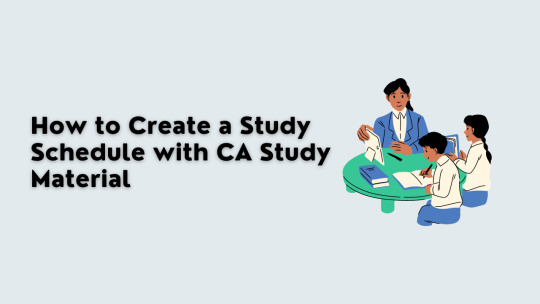
Exam preparation for the Chartered Accountancy (CA) exams involves careful planning and focused study techniques. Making an efficient study plan is essential if you want to cover all the information and give it your all on exam day, especially with the abundance of study materials and extensive syllabus available. This article will assist you in creating a study plan specifically for the CA exams, incorporating the best CA Entrance Exam Books to maximize your study time.
1. Understand the Syllabus and Exam Pattern
Make sure you are familiar with the CA syllabus and exam format before planning your study program. By understanding the relative importance of each subject and how the CA Intermediate and CA Final tests cover a wide range of topics, you can better organize your study time. Using resources like Scanner CA Intermediate Books can also help you get a comprehensive overview and focus your preparation on key areas.
CA Intermediate: The syllabus includes Accounting, Business Laws, Cost and Management Accounting, Taxation, and more.
CA Final: Subjects include Advanced Accounting, Auditing, Financial Reporting, Strategic Financial Management, and others.
Review the syllabus thoroughly and note any specific areas that you find challenging or that carry more weight in the exams.
2. Gather Your Study Materials
Collect all the study materials you will need, including:
Textbooks: Reference books and textbooks recommended by the ICAI.
Scanner/Question Bank: Previous years’ question papers and mock exams.
Notes: Personal notes or summaries you’ve made during your study.
Online Resources: Access to online courses, videos, or webinars if available.
Having all materials at hand will help you avoid interruptions during study sessions.
3. Assess Your Time Availability
Ascertain the number of hours you can commit to studying each day. After taking into account your everyday responsibilities, including employment, classes, and personal commitments, determine how many hours you can actually dedicate to studying each day.
Full-Time Study: If you are studying full-time, aim for 6-8 hours of study per day.
Part-Time Study: If you are working or have other commitments, allocate 2-4 hours per day.
Make sure to include breaks and downtime to avoid burnout.
4. Create a Subject-Wise Study Plan
Divide your study time according to the subjects and topics. Prioritize subjects based on your strengths and weaknesses, as well as the weightage in the exams.
Weekly Goals: Set weekly targets for completing specific topics or chapters.
Daily Tasks: Break down weekly goals into daily tasks. For example, allocate specific days for studying Accounting, Business Laws, or other subjects.
Revision Time: Include regular revision sessions to reinforce your learning and review key concepts.
5. Incorporate Practice and Mock Tests
Make time in your calendar for mock exams and practice. Practicing with past years' questions and answering practice exams will help you find areas that require more study, better manage your time, and comprehend the format of the exam. Additionally, using Scanner CA Foundation Books can be incredibly helpful. These books provide a comprehensive collection of past questions and model answers, which can enhance your exam preparation and ensure you’re well-acquainted with the exam’s structure and common question patterns.
Weekly Practice: Dedicate at least one or two days a week to solving practice papers.
Monthly Mock Tests: Take a full-length mock test at the end of each month to gauge your progress.
6. Adjust and Monitor Your Progress
Review and modify your study plan frequently in light of your development. Modify your plan as needed if you discover that some topics take longer than you had planned or if you're running behind schedule.
Weekly Review: At the end of each week, review your progress and adjust your schedule if needed.
Self-Assessment: Periodically assess your understanding of each topic and identify areas that need more focus.
7. Maintain Balance and Stay Motivated
Maintaining a balance between work and play is crucial, especially when studying for CA examinations. Incorporating Scanner CA Final Books into your study routine can help manage the workload, but it's also important to ensure you have time for hobbies, social activities, and physical exercise. Keeping your mind active and engaged outside of studying will enhance overall well-being and improve exam performance.
Healthy Routine: Follow a healthy lifestyle with adequate sleep, nutrition, and exercise.
Rewards: Set small rewards for achieving study milestones to keep yourself motivated.
Conclusion
The secret to efficiently handling the substantial Study Material for CA is to establish a well-organized study regimen. You'll be ready for your tests if you comprehend the syllabus, get the necessary materials, manage your time, and practice. Maintain a balanced schedule to make studying productive and pleasurable, and review and tweak your strategy frequently to stay on course. You can pass your CA examinations if you put in the necessary effort and prepare strategically.
#scanner ca intermediate books#scanner ca foundation books#scanner ca final books#ca foundation scanner#ca entrance exam books
0 notes
Text
How To Crack CA Foundation Exam in First Attempt

The Chartered Accountancy (CA) Foundation exam is a challenging milestone for aspiring accountants, but with the right strategy and dedication, it's possible to pass on your first attempt. Here’s a comprehensive guide to help you achieve this goal.
Understanding the CA Foundation Exam
The CA Foundation exam, conducted by the Institute of Chartered Accountants of India (ICAI), consists of four papers:
Principles and Practices of Accounting
Business Laws and Business Correspondence and Reporting
Business Mathematics, Logical Reasoning, and Statistics
Business Economics and Business and Commercial Knowledge
Each paper is designed to test your knowledge, analytical skills, and understanding of the subjects. The exam is held twice a year, in May and November.
Step-by-Step Guide to Crack the Exam
1. Understand the Syllabus and Exam Pattern
Before you begin your preparation, familiarize yourself with the syllabus and exam pattern. Knowing the weightage of each topic through CA Foundation Books helps in prioritizing your study plan. The CA Foundation exam includes both subjective and objective questions, with negative marking for the latter. Therefore, understanding the types of questions asked in the exam is crucial, and Books for CA Exam can provide you with the necessary insights. By studying the comprehensive understanding of the exam format and the kind of questions that are likely to be asked.
2. Create a Study Plan
A well-structured study plan is the backbone of your preparation. Allocate time for each subject based on its difficulty level and your proficiency. Here's a suggested timeline:
Month 1-2: Focus on understanding the basics of all subjects.
Month 3-4: Move to advanced concepts and start solving problems.
Month 5: Revision and practice with mock tests and previous years' papers.
Ensure you dedicate at least 6-8 hours daily for studies, with breaks in between to avoid burnout.
3. Use Quality Study Material For CA
Choosing the right study material can make a significant difference. Use Scanner Ca Foundation Books for study modules as your primary resource. Additionally, refer to other recommended books and online resources for different perspectives on difficult topics.
4. Take Notes and Summarize
Taking notes while studying helps in retaining information better. Summarize each chapter in your own words, focusing on key concepts and formulas. These notes will be invaluable during revision.
5. Practice Regularly
Practice is the key to success in the CA Foundation exam. Solve as many problems as you can from different sources. Practice papers, mock tests, and previous years' question papers should be part of your daily routine. This not only helps in understanding the exam pattern but also in managing time effectively during the exam.
6. Focus on Weak Areas
Identify your weak areas early in your preparation. Spend extra time strengthening these topics. Don’t hesitate to seek help from teachers, online forums, or study groups if you’re struggling with certain concepts.
7. Stay Motivated
Preparation for CA Foundation can be a long and stressful journey. Stay motivated by setting small goals and rewarding yourself upon achieving them. Join study groups for support and encouragement from peers.
Conclusion
Cracking the CA Foundation exam on the first attempt requires dedication, strategic planning, and consistent effort. By understanding the syllabus, following a structured study plan, using quality resources, and maintaining a balanced lifestyle, you can increase your chances of success. Remember, persistence and a positive attitude go a long way. Stay focused, and you will achieve your goal. Good luck!
#CA Foundation Books#Scanner Ca Foundation Books#Study Material For Ca#Books For Ca Exam#Study Material For Ca Foundation Books
0 notes
Text
Books For CA Foundation June 2024 Exam
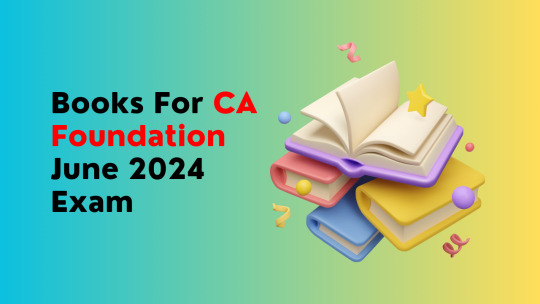
In June 2024, the CA Foundation exam will challenge aspiring Chartered Accountants with a comprehensive assessment covering Accounting, Business Laws, Quantitative Aptitude, and Business Economics. This exam serves as a pivotal milestone in their journey towards professional certification. Candidates must demonstrate proficiency in understanding core concepts, applying knowledge to real-world scenarios, and staying updated with current regulations. Success demands diligent preparation, strategic study techniques, and a thorough grasp of the exam syllabus.
Books for students attempting the CA Foundation Exam June 2024
For students preparing for the CA Foundation exam in June 2024, comprehensive study materials covering all subjects is essential. Opt for CA Foundation books specifically tailored to the CA Foundation syllabus, authored by reputable professionals or institutes. Additionally, solve previous years' question papers and practice mock tests to familiarize yourself with the exam pattern and improve time management skills. Utilize supplementary materials like revision guides and concise notes to reinforce key concepts. Ensure the books are up-to-date with the latest amendments and revisions in relevant laws and regulations. Effective time management and focused study are crucial for success.
Here is the list of best CA Foundation books that students can choose to get the best results in their CA Foundation Exam:
Paper-1: Accounting
Features
Scanner Green Edition CA Foundation Paper 1 Accounting
Solutions as per Schedule III of Companies Act, 2013 and Revised Accounting Standards
Analytical classification of every chapter
Contents establishing correlation between study material and chapter in Scanner
Complete Syllabus
Complete Questions with Solutions
For June 2024 Exam Onwards
Including questions and solutions of June 2023
As per latest updated syllabus of ICAI
Free app for MCQ’s & support
Author: CA Amar Omar, CA Rasika Goenka, CA Nishant Kumar
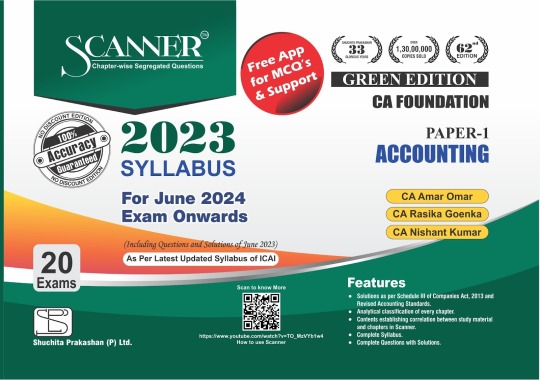
Paper 2: Business Laws
Features
Scanner Green Edition CA Foundation Paper 2 Business Laws
Solutions as per Schedule III of Companies Act, 2013 and Revised Accounting Standards
Analytical classification of every chapter
Contents establishing correlation between study material and chapter in Scanner
Complete Syllabus
Complete Questions with Solutions
For June 2024 Exam Onwards
Including questions and solutions of June 2023
As per latest updated syllabus of ICAI
Free app for MCQ’s & support
Author: CA Amar Omar, CA Rasika Goenka
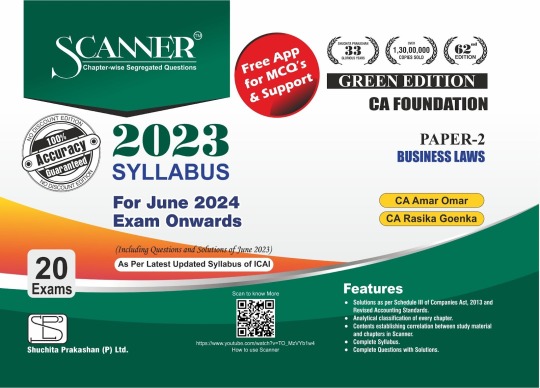
Paper 3: Quantitative Aptitude
Features
Scanner Green Edition CA Foundation Paper 2 Business Laws
Solutions as per Schedule III of Companies Act, 2013 and Revised Accounting Standards
Analytical classification of every chapter
Contents establishing correlation between study material and chapter in Scanner
Complete Syllabus
Complete Questions with Solutions
For June 2024 Exam Onwards
Including questions and solutions of June 2024
As per latest updated syllabus of ICAI
Author: CA Amar Omar, CA Rasika Goenka, CA Nishnat Kumar
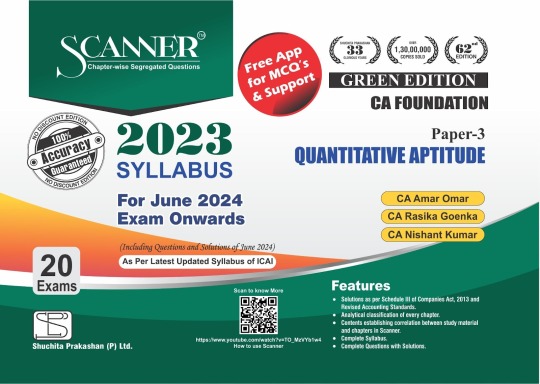
Paper 4: Business Economics
Features
Scanner Green Edition CA Foundation Paper 2 Business Laws
Solutions as per Schedule III of Companies Act, 2013 and Revised Accounting Standards
Analytical classification of every chapter
Contents establishing correlation between study material and chapter in Scanner
Complete Syllabus
Complete Questions with Solutions
For June 2024 Exam Onwards
Including questions and solutions of June 2024
As per latest updated syllabus of ICAI
Author: CA Amar Omar, CA Rasika Goenka
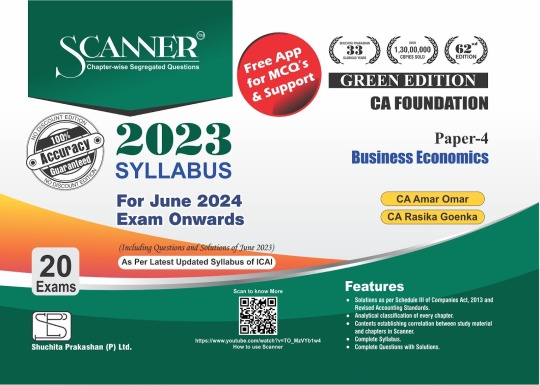
Conclusion
As students prepare for the CA Foundation exam in June 2024, the importance of choosing the appropriate ca foundation study materials cannot be overstated. Opt for textbooks specifically designed to align with the syllabus. Focus on comprehension rather than mere memorization, and allocate sufficient time to practicing with mock tests and previous exam papers. Embrace a well-rounded study strategy and remain abreast of any regulatory updates. With this approach, candidates can approach the exam confidently and set themselves on the path to success in the rigorous realm of Chartered Accountancy.
0 notes
Text
Books For CA Foundation June 2024 Exam
In June 2024, the CA Foundation exam will challenge aspiring Chartered Accountants with a comprehensive assessment covering Accounting, Business Laws, Quantitative Aptitude, and Business Economics. This exam serves as a pivotal milestone in their journey towards professional certification. Candidates must demonstrate proficiency in understanding core concepts, applying knowledge to real-world scenarios, and staying updated with current regulations. Success demands diligent preparation, strategic study techniques, and a thorough grasp of the exam syllabus.
Books for students attempting the CA Foundation Exam June 2024
For students preparing for the CA Foundation exam in June 2024, comprehensive study materials covering all subjects is essential. Opt for CA Foundation books specifically tailored to the CA Foundation syllabus, authored by reputable professionals or institutes. Additionally, solve previous years' question papers and practice mock tests to familiarize yourself with the exam pattern and improve time management skills. Utilize supplementary materials like revision guides and concise notes to reinforce key concepts. Ensure the books are up-to-date with the latest amendments and revisions in relevant laws and regulations. Effective time management and focused study are crucial for success.
Here is the list of best CA Foundation books that students can choose to get the best results in their CA Foundation Exam:
Paper-1: Accounting
Features
Scanner Green Edition CA Foundation Paper 1 Accounting
Solutions as per Schedule III of Companies Act, 2013 and Revised Accounting Standards
Analytical classification of every chapter
Contents establishing correlation between study material and chapter in Scanner
Complete Syllabus
Complete Questions with Solutions
For June 2024 Exam Onwards
Including questions and solutions of June 2023
As per latest updated syllabus of ICAI
Free app for MCQ’s & support
Author: CA Amar Omar, CA Rasika Goenka, CA Nishant Kumar

Paper 2: Business Laws
Features
Scanner Green Edition CA Foundation Paper 2 Business Laws
Solutions as per Schedule III of Companies Act, 2013 and Revised Accounting Standards
Analytical classification of every chapter
Contents establishing correlation between study material and chapter in Scanner
Complete Syllabus
Complete Questions with Solutions
For June 2024 Exam Onwards
Including questions and solutions of June 2023
As per latest updated syllabus of ICAI
Free app for MCQ’s & support
Author: CA Amar Omar, CA Rasika Goenka

Paper 3: Quantitative Aptitude
Features
Scanner Green Edition CA Foundation Paper 2 Business Laws
Solutions as per Schedule III of Companies Act, 2013 and Revised Accounting Standards
Analytical classification of every chapter
Contents establishing correlation between study material and chapter in Scanner
Complete Syllabus
Complete Questions with Solutions
For June 2024 Exam Onwards
Including questions and solutions of June 2024
As per latest updated syllabus of ICAI
Author: CA Amar Omar, CA Rasika Goenka, CA Nishnat Kumar

Paper 4: Business Economics
Features
Scanner Green Edition CA Foundation Paper 2 Business Laws
Solutions as per Schedule III of Companies Act, 2013 and Revised Accounting Standards
Analytical classification of every chapter
Contents establishing correlation between study material and chapter in Scanner
Complete Syllabus
Complete Questions with Solutions
For June 2024 Exam Onwards
Including questions and solutions of June 2024
As per latest updated syllabus of ICAI
Author: CA Amar Omar, CA Rasika Goenka

Conclusion
As students prepare for the CA Foundation exam in June 2024, the importance of choosing the appropriate ca foundation study materials cannot be overstated. Opt for textbooks specifically designed to align with the syllabus. Focus on comprehension rather than mere memorization, and allocate sufficient time to practicing with mock tests and previous exam papers. Embrace a well-rounded study strategy and remain abreast of any regulatory updates. With this approach, candidates can approach the exam confidently and set themselves on the path to success in the rigorous realm of Chartered Accountancy.
0 notes
Text
Ca Entrance Exam Books | CUET Books | CS | CMA | Scanneradda
Best CA Foundation Books for the CA Foundation Exam 2023
What is the CA Foundation Exam?
The CA Foundation exam is the entry-level examination for the Chartered Accountancy course in India. It is administered by the Institute of Chartered Accountants of India (ICAI). Candidates who have completed their 10+2 education or its equivalent are eligible to take the CA Foundation exam. The exam consists of four papers: Principles and Practice of Accounting, Business Laws and Business Correspondence and Reporting, Business Mathematics and Logical Reasoning & Statistics, and Business Economics and Business and Commercial Knowledge. Successful completion of the CA Foundation exam is a prerequisite for registering for the intermediate level of the Chartered Accountancy course.
Syllabus:
The CA Foundation syllabus consists of four papers:
Paper 1: Principles and Practice of Accounting
This paper covers the basic concepts of accounting, including accounting principles and conventions, accounting for different types of transactions, preparation of financial statements, and the use of accounting software.
Paper 2: Business Laws and Business Correspondence and Reporting
This paper covers business laws, including the Indian Contract Act, the Sale of Goods Act, the Limited Liability Partnership Act, and the Companies Act. It also covers business correspondence and reporting, including letter writing, report writing, and the use of computers in business communication.
Paper 3: Business Mathematics and Logical Reasoning & Statistics
This paper covers mathematical concepts and techniques that are useful in business, such as arithmetic, algebra, geometry, trigonometry, and statistics. It also covers logical reasoning and statistics, including data interpretation and analysis.
Paper 4: Business Economics and Business and Commercial Knowledge
This paper covers the basic concepts of micro and macro economics, including the theory of demand and supply, production and cost, market structures, and business cycles. It also covers business and commercial knowledge, including the Indian economic environment and the role of government in promoting economic development.
Books You Can prefer for your CA Foundation Exam
There are many good CA Foundation books that students can prefer for their CA Foundation Exam and some of them are listed below:
Paper 1: Principles and Practice of Accounting
Green Edition: CA Foundation Paper 1 Solved Scanner
Features:
Chapter-wise Segregated Questions
Including Questions and Solutions of Dec. 2022
As per the latest updated syllabus of ICAI
Solutions as per Schedule III of Companies Act, 2013 and Revised Accounting Standards.
Analytical classification of every chapter
Contents establishing correlation between study material and chapters in Solved Scanner
Complete Syllabus
Complete Questions with Solutions
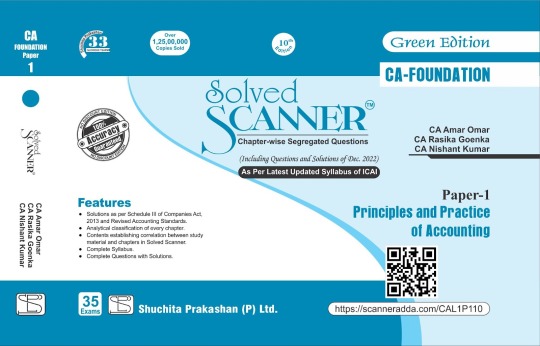
Paper 2: Business Laws and Business Correspondence and Reporting
Green Edition : CA Foundation Paper 2 Solved Scanner
Features:
Chapter-wise Segregated Questions
Including Questions and Solutions of Dec. 2022
As per latest updated syllabus of ICAI
Contents establishing correlation between study material and chapters in Solved Scanner
Analytical classification of every chapter
Complete Syllabus
Complete Questions with Solutions
Updated as per Companies ( Amendment) Act, 2020
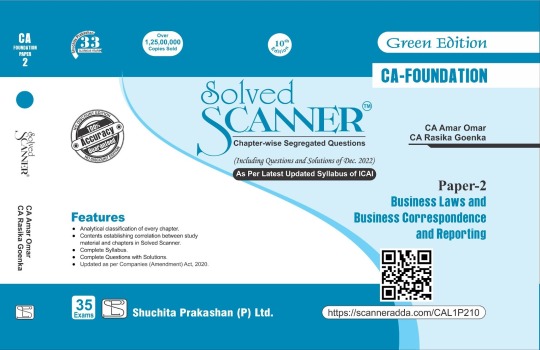
Paper 3: Business Mathematics, Logical Reasoning, and Statistics
Green Edition : CA Foundation Paper 3 Solved Scanner
Features:
Chapter-wise Segregated Questions
Including Questions and Solutions of Dec. 2022
As per latest updated syllabus of ICAI
Analytical classification of every chapter
Marks of each question/part question
Contents establishing correlation between study material and chapters in Solved Scanner
Complete Syllabus
Complete Questions with Solutions
Questions for Practice in Some Chapters
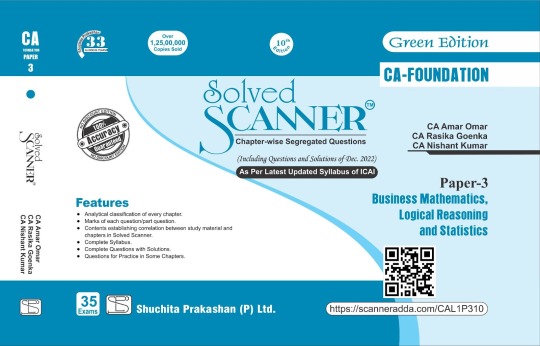
Paper 4: Business Economics and Business and Commercial Knowledge
Green Edition : CA Foundation Paper 4 Solved Scanner
Features:
Chapter-wise Segregated Questions
Including Questions and Solutions of Dec. 2022
As per latest updated syllabus of ICAI
Analytical classification of every chapter
Marks of each question/part question
Contents establishing correlation between study material and chapters in Solved Scanner
Complete Syllabus
Complete Questions with Solutions
Questions for Practice in Some Chapters
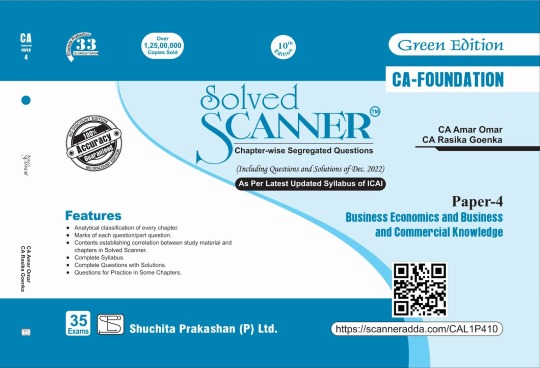
Final Words:
After class 12th, becoming a Chartered Accountant is one of the most popular career choices. It is administered by the Institute of Chartered Accountants of India, a national professional accounting body. The CA exam has three levels and one must pass all three levels to become a CA. The very first is the CA Foundation which can be given after the 12th grade. For this exam to be passed, one has to be familiar with the ICAI's syllabus and exam pattern. There are four papers in the CA Foundation exam. With the help of Shuchita Prakashan's CA Entrance Exam Books, one can surely pass the exam. As per ICAI guidelines, these are the best books for aspirants preparing for the CA Foundation Exam.
0 notes
Text
How to Preparation for CA foundation in 4-5 months
CA Foundation is the primary level of Chartered Accountant exam and, also known as CA CPT. This is not a course, it is a professional course. After completing your registration student get confused how preparing for exams don't worry we provide a smart point for preparation in 4to5 months.
All exam conducted by The Institute of Chartered Accountants of India. Foundation has two attempts first in June and December. Students learn accounting and principles at a very deep level and understanding of study on the different types of accounts. ICAI did major changes in this course after September 2017 CA CPT knows as CA Foundation course. The new course syllabus is much harder than the older course. Student wants to become successful in this field then have to clear the first entrance exam.
The candidate who is appearing or passed 12th class with any recognized board they can appear for the exam. First, they can register on ICAI After fill the CA Foundation exam.
In this article, we provide you with complete details regarding how to clear CA Foundation in 4 to 5 months.
These Four subjects in CA Foundation
Principles and Practices of Accounting.
Business Laws and Business Correspondence and Reporting.
Business Mathematics and Logical Reasoning and Statistics.
Business Economics and Business and Commercial Knowledge
1.Proper Planning: Make Time Table
This is the Primary step for Studies makes your own time table. Some Student thinks making a time table is wastage of time but this is not wasting time it saves you precious time so prepare a proper plan for your work and study. Select study material and allotted time to every chapter wise and subject according to the days left in your exam. This will save you time in exam times and help you to analyze the performance.
2. Join Institute and CA Foundation Coachings
Some Students clear Ca Foundation exam without coaching with just passing marks But we suggest if you want to become a good CA then you have to join coaching classes. Coachings classes and teachers play a big role in your success. The student must have clarity on the particular topic, concepts basic level. CA has the longest journey where you need help from Coachings, teachers, Materials, Properguidence so these coatings give you clarity.
3.Focus on Weak subject: Statistics, aptitude & Reasoning
If you belong to non-maths commerce then you have to focus on the main topic which is weak the major issue is non-maths and commerce background student does not to be scoring subjects. Reasoning Subject covers 20 marks remaining part is divided equally into maths and statistics.
4. For Quick Revision: Prepare your own Notes
After completing your chapter or topic you have to prepare your own handwriting notes for quick revision which helps you in exam times for quick revision. During the classes make short notes which will help you in exam times.
5.Command: Quick Command over Calculator
ICAI allows the calculator in exam halls because ICAI doesn't want his students facing problems in exams and applicants to do labor work so they permit to use the calculator. Keep it in your mind you're the short keys like M+, M- etc.
6. Breaks: Take Powerpack short breaks
Take 10-15 min shorts breaks during your study if you want to study because if you study constructively then do not study continuously for the whole day or night. You take a break-in every 2-4 hours to refresh your mind. Set your time table according to you as you like the study of topics just like to study theory subjects in the morning and thereafter study practical subjects.
7.Solving Model Test Papers
If you want to be a success in Ca then we suggest you must solve the model test papers because they teach you time management and analyze how to ask the questions in exams. Some students do not solve the model test papers because they think this is a waste of time but this will help yours in exams. So, we suggest solving mock test after completing chapter and course
8. Presentation: Formating of Presentation
This is not a school exam this is a professional course so do not take it lightly. In CA Foundation exam is the most important thing is the presentations. In CA Exam there are two papers objective and two are subjective. So students need to focus on presentations.
9.Revision: At Least 4 to 5 time
CA Foundation syllabus is very large so prepare your notes according to the examination time when exam on the head then quick revised your course. Proper planned your revision and mark the same type question so that when you revised your syllabus these type question won't get wasting your time. In Second Revision tries to solve every topic. In third revision think which question create a problem for you solve it and final revision revised the whole syllabus
10. Last Step : Revision and presentation
Set a valuable and time-based goal for the last revision and prepare for how to present yourself in the examination.
1 note
·
View note
Text
CA Foundation Books for November 2022 Exams!!
The CA Foundation test is offered by the ICAI twice a year, in May and November. The authentic CA Foundation Course Books should be used by the candidates who have registered for the exam and have started their preparation in order to succeed for the CA foundation test 2022. It's important to consult the CA Foundation 2022 recommended syllabus if one wants to do well in the test. It helps the candidates in covering all topics.
CA Foundation Syllabus:
CA Foundation Syllabus is divided into four papers:
Principles and Practice of Accounting
Business Laws and Business Correspondence and reporting
Business Mathematics, Logical Reasoning and Statistics
Business Economics and Business and Commercial Knowledge
The topics covered in the syllabus serve as the basis for the questions in the CA Foundation exam in 2022. Therefore, during their preparation, candidates should refer to the CA Foundation syllabus 2022.
CA Foundation 2022 Study Material:
Scanner Adda is an online portal where students can get recent study material for CA Foundation December 2022 exam. All of the topics, subtopics, and other pertinent materials recommended for the exam are included in those CA Foundation Books. For “I need an MBA for running my business but a CA to teach them How to run the business.” – Ratan Tata
Institute of Chartered Accountants of India (ICAI), which was created by the Chartered Accountants Act, 1949, regulates chartered accountants in India. Associate members of the ICAI are permitted to prefix their names with the letters CA. To become CA in India is not a child’s play. It needs consistency and a lot of hard work. CA Foundation Books can help you to crack the CA Foundation exam and make you ready for the next level. Members may use the title "Fellow Chartered Accountant'' if they have been practising full-time for five years (FCA).
Entry to the profession can be made by taking the CA Foundation Course after completing the 12th grade.
What is CA Foundation Exam?
easy review, it also includes references, mock test papers, and question banks from prior years. In order to do better in the exam, students should consult these books.
The CA is one of the hardest exams to pass, thus one will need to make use of the right tools and direct all of their efforts in the right directions to clear the test. Therefore, before you start your preparation, you must be aware of the top books and study materials for the CA Foundation test.
Here is a comprehensive list of the Best Books for the CA Foundation Exam for the examinations in 2022.
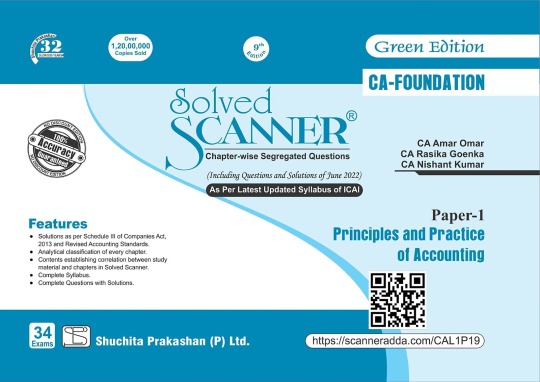
Green Edition CA Foundation Solved Scanner
PAPER-1: Principles and Practice of Accounting
As per latest updated syllabus of ICAI
Chapter wise segregated questions
(Including questions and solutions of June 2022)
Features:
Solution as per Schedule III of Companies Act, 2013 and revised Accounting Standards.
Analytical Classification of every chapter.
Contents establishing correlation between study material and chapters in Solved Scanner.
Complete Syllabus
Complete Questions with Solutions
Green Edition CA Foundation Solved Scanner
PAPER-2: Business Laws and Business Correspondence and reporting
As per latest updated syllabus of ICAI
Chapter wise segregated questions
(Including questions and solutions of June 2022)
Features:
Solution as per Schedule III of Companies Act, 2013 and revised Accounting Standards.
Analytical Classification of every chapter.
Contents establishing correlation between study material and chapters in Solved Scanner.
Complete Syllabus
Complete Questions with Solutions

Green Edition CA Foundation Solved Scanner
PAPER-3: Business Mathematics, Logical Reasoning and Statistics
As per latest updated syllabus of ICAI
Chapter wise segregated questions
(Including questions and solutions of June 2022)
Features:
Solution as per Schedule III of Companies Act, 2013 and revised Accounting Standards.
Analytical Classification of every chapter.
Contents establishing correlation between study material and chapters in Solved Scanner.
Complete Syllabus
Complete Questions with Solutions
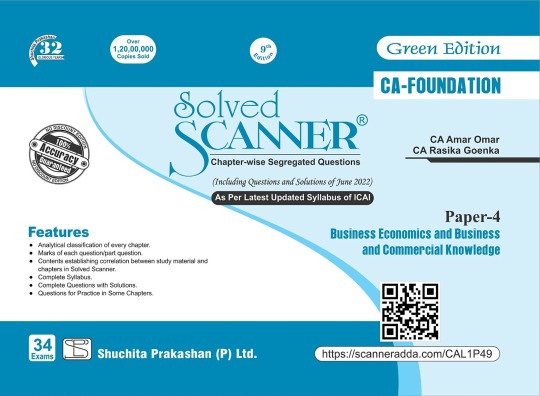
Green Edition CA Foundation Solved Scanner
PAPER-4: Business Economics and Business and Commercial Knowledge
As per latest updated syllabus of ICAI
Chapter wise segregated questions
(Including questions and solutions of June 2022)
Features:
Solution as per Schedule III of Companies Act, 2013 and revised Accounting Standards.
Analytical Classification of every chapter.
Contents establishing correlation between study material and chapters in Solved Scanner.
Complete Syllabus
Complete Questions with Solutions
Conclusion:
One of the most popular career choices for students after class 12th is to become a Chartered Accountant in India. All CA exams are administered by the Institute of Chartered Accountants of India, a national professional accounting body in the nation. There are three levels of CA exam and to become a CA one should qualify all the three levels. The very first is the CA Foundation which can be given after the 12th grade. To pass this exam one should know the correct syllabus and the exam pattern which is strictly made by ICAI. There are four papers in the CA Foundation exam. One can surely clear the with the help of Study Material For CA Foundation by Shuchita Prakashan. These are the best books for any aspirants who is preparing for the CA Foundation Exam as per the guidelines of ICAI. So all the best everyone for the preparations.
Source by: http://www.scanneradda.com/product.php?mtd=CA
0 notes
Text
12 Things You Should Know While Preparing For CA Foundation Exam
This blog will take you through a lot of useful resources, experiences, tips & tricks while you are preparing for CA Foundation Exams.
Table Of Contents
1. What is the overall structure of the CA Foundation Exam? 2. What kind of timeline does the CA Foundation preparation take? 3. What content should I use for my CA Foundation Preparation? 4. How can I make time crunching my superpower and how many reads of the syllabus are advisable? 5. Can I do a selective study of certain topics within a subject or do I need to know it all? 6. How important is it to prepare summaries for the various subjects and how do I prepare such handy summaries? 7. How important is it to practice Mock Exams? 8. What are the presentation tips and tricks to crack the structured papers of Accounting & Law? 9. Which calculator is allowed for the Exam? 10. Which Color pen is allowed for the ICAI Exams? 11. What are the major challenges faced by students while attempting the Exam on the D Day & how must I prepare in advance to meet those challenges? 12. Some suggestions on how I can manage time & stress and sail through efficiently?
Read about: Best test series for ca inter at CA Test Series.
1. What is the overall structure of the CA Foundation Exam?
The CA Foundation Exam is divided into 4 subjects with a minimum passing criterion of 40 marks for each subject and an aggregate of 200 marks overall.
PaperSubjectsMarksTime Allotted in ExamAssessment
1.Principles & Practice of Accounting (20% Theory, 80% Practical)1003 HoursStructured
2.Business Laws & Business Correspondence and ReportingBusiness Laws – 40 Business Correspondence and Reporting – 603 Hours
3.Business Mathematics & Logical Reasoning & StatisticsBusiness Mathematics – 40 Logical Reasoning – 20 Statistics – 402 HoursObjective (100 MCQs with 0.25 negative marking)
4.Business Economics & Business and Commercial Knowledge (BCK)Business Economics – 60 Business and Commercial Knowledge – 402 Hours
5.Total400 Marks
Please Note – No set-off or exemption is granted for any of the subjects.
ICAI Registration for the CA Foundation exam is done in 2 parts:
Course Registration – This registration is to be done in advance depending on your attempts Before 1st January for May Attempt and Before 1st July for November 2021 Attempts.
Exam Registration – This is to be done to register for the attempt and the window for the same opens 2-3 months before the exam is scheduled.
2. What kind of timeline does the CA Foundation preparation take?
Being your first professional exam, a student must ensure that they enroll themselves with a Coaching Provider who has the experience of Coaching the students across all levels of Chartered Accountancy Course.
CA Foundation syllabus takes nearly 500 hours of first-time study with your coaching provider and 300 hours of self-study. This typically spans over 6-7 months as: Coaching: 4 – 4.5 months. Self-Study & Exam Preparation – 3 months.
It is recommended that you try to complete the entire syllabus in the first read at least 3 – 3.5 months before your exam the help of chapter-wise tests, cluster tests and prelims.
3. What content should I use for my CA Foundation Preparation?
Base content to be used should be that of your Coaching Provider. However, it is critical that you also go through the content provided by the ICAI which must be kept as your central reference.
Visit here for the below material:
ICAI Study Material
Past Examination Papers
Revision Test Papers (‘RTPs’) – Issued by ICAI a couple of months before each attempt. They have chapter wise questions to help revise certain topics.
Mock Test Papers (‘MTPs’) – ICAI conducts mock exams before each attempt.
*Pro Tip – For additional practice, especially for the MCQ subjects, students can make use of Scanners of collated questions available online.
4. How can I make time crunching my superpower and how many reads of the syllabus are advisable?
Break down your entire portion into groups of subjects (Structured and MCQs). It is recommended that you take up at least 2 subjects a day to ensure efficient study and keep monotony at bay.
We would recommend 3 detailed revisions and a mock revision from exam perspective for a thorough knowledge of the topics.
The number of hours you dedicate per day in your Self Study Leave period should gradually increase. It may be fair to plan more frequent breaks and smaller study slots in the beginning to set yourself in motion. We would recommend starting off with 6-7 hours a day and eventually escalating it to 8-9 hours at your peak.
Suggestive Timeline (PS: It may vary depending on your level of pre–preparation and your comfort with the subject)
E.g., When 12 days have been allotted to Accounting in the 1st read, take 24 half days to cover the portion and take up some other subject in the other half of the day.
5. Can I do a selective study of certain topics within a subject or do I need to know it all?
Selective study is NEVER an option – you never know what portion of your syllabus will be tested in your exam.
However, to learn about the critical topics and their weightage and more importantly, for you to know which topics YOU will need extra effort depending on your ease, refer to this document issued by ICAI. Click here.
6. How important is it to prepare summaries for the various subjects and how do I prepare such handy summaries?
Revisions are the key to clear CA Foundation and the best way to effectively revise again and again is to use watered-down versions of your notes.
Subjects - Tips
Accounting - Maintain a log of important and tricky questions with the concepts and a repository of formula formats and specimen journal entries.
Law & English - A consolidated list of section numbers across various Acts will help to recall the section numbers in the exam paper. Make compact notes of Grammar Rules for English.
Mathematics & Statistics - Make a repository of all the important formulae, shortcuts, and concepts.
Economics & BCK - Develop summary notes for the various concepts and for statistics record of facts and figures.
Make effective use of ICAI developed summaries “Reference for Quick Revision”.
*Pro Tip – Record your understanding of comparatively complicated topics through voice notes so that you don’t waste time on them again.
7. How important is it to practice Mock Exams?
The CA exams can well be described as a game of chess – the best trick to know your way through exams is practice. Mocks give an idea of what’s to come – the nerves before the exam, problems relating to recollecting and associating questions to the related topics, dealing with the anxiety of not knowing and managing your speed.
It is advisable to schedule at least two mock exams along with several chapter-wise and cluster tests.
When attempting mock exams for the MCQ based subjects, use OMR sheets for efficient practice. You may get a limited number of sheets for rough work – practice to make judicious use of the sheets while giving mock exams.
8. What are the presentation tips and tricks to crack the structured papers of Accounting & Law?
The most important tip in presentation – Make the Job of the Examiner Easy!
Steps form an integral part of your ACCOUNTING PAPER, – Make sure you don’t miss out on any questions. You may not know the entire solution to a question but try to explain as many steps as possible and grab those marks! Ensure that you add a working note wherever necessary to make your answer detailed and comprehensive.
In BUSINESS LAW & ENGLISH, make sure your answers are crisp but detailed. Quote section numbers (as much as possible), explain the provisions, correlate the question with the provision and then give a conclusion. In case of lengthy answers, try to break down the various points into bullets to help the examiner navigate seamlessly across the answer.
While there is no ICAI recommended format for the answers – refer to 4-5 attempts’ past papers, and the last 3 RTPs, MTPs to get an idea about expected questions and the recommended formats to answer the same.
9. Which calculator is allowed for the Exam?
A student must use a Cordless Portable Calculator with up to 6 functions, 12 digits and 2 memories.
10. Which Color pen is allowed for the ICAI Exams?
As per the recent notification, only Black Ball Point Pens are allowed for the exams. However, request you to read in detail the terms and conditions outlined in your hall ticket for timely changes if any.
11. What are the major challenges faced by students while attempting the Exam on the D Day & how must I prepare in advance to meet those challenges?
Challenge. - Solution
Anxiety before the exam - Set aside your books an hour before the exam, Stay confident
Recollecting and associating questions to the related topics - Attempting mock exams
Managing your speed
Inability to scrunch the syllabus in the 1.5 days - Prepare handy summaries
Dealing with the stress of not knowing - Do not take up a new topic 1 day before exams
Excessive Fatigue - Sleep for 6-7 hours before exams, stay hydrated, do not go overboard with your studies
12. Some suggestions on how I can manage time & stress and sail through efficiently?
Here are a few simple tips that will help you calm your nerves, keep track of time, and avoid burnouts, which is extremely important.
Peak at the right time – do not overburden yourself by studying for 8-9 hours right at the beginning
Schedule in buffer days for contingencies
Keep Sunday evenings free to rest and unwind – it helps you get set for the next week
Relax in breaks by having a chat with family/ friend, meditating, listening to music – steer away from any kind of books/ reading, preferably avoid excessive screen exposure
Stick to a nourishing diet and avoid oily meals that may upset your belly, make you drowsy and ruin your mood
Rest well by sleeping for 7-8 hours – NEVER compromise on a good sleep
Stay fit by going for a run or working out/ Doing yoga
Stay hydrated at all times
Do not compare yourself with your friend who is also studying for the exam. Each one has a different process & no one is right or wrong. What works for you, works only for you.
That’s all from our end for now! Stay consistent and keep practicing!
Stay tuned for How to prepare One Day before the Exam Day!
0 notes
Text
California Coalition Calls for Moratorium on State Gang Database
EFF has joined a coalition of civil rights, immigration, and criminal justice reform organizations to demand the California Department of Justice (CADOJ) place an immediate moratorium on the use of the state’s gang database, also known as CalGang.
For years, EFF has stood beside many of these organizations to advocate for reforms to the CalGang system, which has tarnished the records of countless Californians—largely Black and Latinx—by connecting them to gangs based on the thinnest of evidence. Indeed, sometimes the information has been falsified, as was revealed to be the case with the Los Angeles Police Department (LAPD) earlier this year. In previous legislative sessions, we supported multiple pieces of legislation by Assemblymember Shirley Weber to overhaul CalGang. However, the CADOJ has missed many of the deadlines created by these statutes, so it’s clear that simply hoping for reform isn’t enough. Just as LAPD suspended its use of gang databases this month, use of CalGang must come to a dead stop until, at minimum, CADOJ fully implements reforms required by existing legislation. EFF also supports the abolition of CalGang altogether.
Below is the text of the letter signed by the coalition of gang-database activists, as well as members of the technical advisory board set up by the state to provide guidance on CalGang.
Dear Attorney General Becerra,
Since the murder of George Floyd, Californians have taken to the streets to express their outrage and grief, but most importantly to state that Black Lives Matter. Millions of people exercising their First Amendment rights these past weeks have demonstrated the insufficiency of the California Department of Justice’s actions to meet their longstanding demand that law enforcement treat everyone with respect and dignity. Nowhere is that more true than in the Department’s ineffective effort to reform law enforcement’s use of the CalGang database.
To remedy this, we the undersigned organizations and individuals demand the Department must immediately place a moratorium on the use of CalGang Database until (1) regulations for its use are adopted, (2) trainings are developed with purposeful community input and approved by the Department, and (3) all users have completed these trainings.
On October 12, 2017, the Legislature chaptered AB 90, assigning to the Department the task of regulating law enforcement agencies’ use of shared gang databases, with instruction to adopt rules that would address the racially-biased overinclusion of Black people and other people of color. The Legislature gave the Department a deadline of January 1, 2020 to accomplish this task. As of the date of this letter, regulations have yet to be adopted. The Department’s most recent Revisions to Proposed Regulations (OAL Register 2019-0430-06) delete even the Department’s revised deadline of July 1, 2020 without offering any new date. In the meantime, the CalGang database continues to be utilized by law enforcement agencies under the old policies and practices which the Legislature expressly found unacceptable in 2017. Furthermore, the currently proposed regulations have prioritized codifying the existing criteria and practices of law enforcement agencies that led to the criminalization of Black and Latino Californians over the Legislature’s stated goal of shielding communities from this unnecessary labeling and its dangerous effects.
CalGang is emblematic of the type of policing that has directly led to the recent unrest throughout the country. Gang units and other patrols fan out across communities, target Black people and other people of color, stop them under pretexts like a traffic stop or a supposedly “consensual” stop, use racist stereotypes to deem them “gang members,” and add their names and information into the database to be tracked. Police then use these gang labels to justify further stops, interrogations, uses of force, and enhanced punishment. The Department has yet to accomplish anything to eradicate this practice despite the Legislature’s instruction and statutory grant of authority to do exactly that. To the contrary, it has affirmatively rejected amendments grounded in empirical evidence and community input that would limit the likelihood of harm inflicted upon communities of color.
While many of us believe that all law enforcement gang databases must be abolished, a moratorium until the Department has fully implemented reforms that are consistent with its legislative grant of power is a reasonable and appropriate step that the Department can immediately take while abolition of gang databases is considered by the broader group of stakeholders. The Department has little excuse not to take this step. In 2018, the legislature imposed a moratorium with no negative consequences. Currently, the Los Angeles Police Department, CalGang’s largest user, has imposed a second moratorium on their department’s use of CalGang - spurred by the recognition that some entries lack a factual basis and are driven by harmful presumptions based at least in part upon race, and after finally acknowledging the damaging effects of continued use of this system, particularly upon the Black community.
The Department can no longer allow CalGang to continue under the unacceptable old policies and procedures while the Department misses deadline after deadline, deferring reform. Now is the time for the Department to recognize that truth, and alongside community partners take immediate concrete actions by enacting an immediate moratorium on all use of CalGang. The Department should also take this moment to revisit the proposed regulations and adopt rules for the use of CalGang that provide real protections to the communities wrongly targeted by gang labeling for far too long.
Sincerely,
ACLU of California Coalition for Humane Immigrant Rights (CHIRLA) Loyola Immigrant Justice Clinic Urban Peace Institute Sammy Nunez - Gang Database Technical Advisory Committee Chair Marissa Montes – Gang Database Technical Advisory Committee Jeremy Thornton – Gang Database Technical Advisory Committee Paul Carrillo – Gang Database Technical Advisory Committee Michael Scaffidi – Gang Database Technical Advisory Committee 2nd Call Anti-Recidivism Coalition Asian Americans Advancing Justice - CA Asian Americans Advancing Justice - Los Angeles Breaking Through Barriers to Success California Alliance for Youth and Community Justice (CAYCJ) California Attorneys for Criminal Justice Californians for Safety and Justice California Immigrant Policy Center Central American Resource Center (CARECEN) Chicanxs Unidos Chispa Community Advocates for Just and Moral Governance (MoGo) Consumer Attorneys of California Criminal Justice Clinic, UC Irvine School of Law Detours Mentoring Group, Inc. Electronic Frontier Foundation Ella Baker Center for Human Rights Fathers & Families of San Joaquin Friends Committee on Legislation of California Ground Game LA H.E.L.P.E.R. Foundation Healing Hearts Restoring Hope Homeboy Industries Homies Unidos Immigrant Defense Advocates Immigrant Legal Resource Center Latino Coalition for a Healthy California National Association of Social Workers (NASW) California Chapter PICO California Project Kinship Promesa Boyle Heights Public Counsel Restore Justice Southern California Cease Fire Committee Southern California Crossroads UC Irvine School of Law Immigrant Rights Clinic Young Visionaries Youth Leadership Academy
For the full letter click here.
from Deeplinks https://ift.tt/315wno8
0 notes
Text
Is 70 Days enough to Clear the CA Final Group 1 from Scratch ?
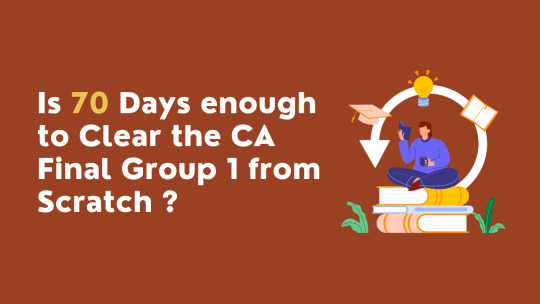
The Chartered Accountancy (CA) Final is one of the most challenging exams in the field of finance and accounting. Clearing CA Final Group 1 requires not only a solid understanding of complex concepts but also the ability to apply them in various scenarios. If you’re starting from scratch with just 70 days to prepare, the task might seem daunting, but it is not impossible. With the right strategy, focus, and discipline, you can significantly improve your chances of success. One valuable resource to consider during your preparation is using Scanner CA Final books. These books can help you identify important topics and frequently asked questions, providing a targeted approach to your study plan.
1. Understand the Syllabus and Prioritize
The first step is to thoroughly understand the syllabus for CA Final Group 1. The group covers four key subjects:
Financial Reporting
Strategic Financial Management (SFM)
Advanced Auditing and Professional Ethics
Corporate and Economic Laws
Given the vastness of the syllabus, it's essential to prioritize topics based on their weightage in the exam. Focus on high-scoring areas first, ensuring that you cover essential topics that are likely to appear in the exam. Create a study plan that allocates sufficient time to each subject, with more time dedicated to complex topics.
2. Create a Detailed Study Plan
A well-structured study plan is crucial when you have limited time. Break down the 70 days into weeks and further into days, assigning specific topics and chapters to each day. Ensure that your plan includes time for revision and practice exams. A suggested plan might look like this:
Focus: Core Subjects Overview
Day 1-2: Review Subject 1 - Read through main topics and key chapters.
Day 3-4: Practice questions from the CA Final scanner for Subject 1.
Day 5-6: Review Subject 2 - Focus on important chapters and concepts.
Day 7: Practice questions from the CA Final scanner for Subject 2.
Weeks 3-4:
Focus: Deep Dive into Subjects
Day 8-10: Study Subject 1 in detail - Major topics and past papers.
Day 11-13: Practice questions from the CA Final scanner for Subject 1.
Day 14: Revision of Subject 1.
Day 15-17: Study Subject 2 in detail - Major topics and past papers.
Day 18-20: Practice questions from the CA Final scanner for Subject 2.
Day 21: Revision of Subject 2.
Weeks 5-6:
Focus: New Subjects and Integration
Day 22-24: Study Subject 3 - Main topics and key areas.
Day 25-27: Practice questions from the CA Final scanner for Subject 3.
Day 28: Revision of Subject 3.
Day 29-31: Study Subject 4 - Major topics and focus areas.
Day 32-34: Practice questions from the CA Final scanner for Subject 4.
Day 35: Revision of Subject 4.
Weeks 7-8:
Focus: Mock Exams and Revision
Day 36-38: Take mock exams for Subjects 1 and 2.
Day 39-40: Review and analyze mock exam results for Subjects 1 and 2.
Day 41-43: Take mock exams for Subjects 3 and 4.
Day 44-45: Review and analyze mock exam results for Subjects 3 and 4.
Weeks 9-10:
Focus: Final Revision and Exam Strategy
Day 46-48: Revise all subjects with a focus on weaker areas.
Day 49-51: Final practice with CA Final scanner questions for all subjects.
Day 52-53: Take full-length mock exams and analyze results.
Day 54-56: Adjust study focus based on mock exam results.
Weeks 11-10:
Focus: Final Preparation
Day 57-59: Intensive revision of key topics and weak areas.
Day 60-62: Review important formulas, concepts, and CA Final scanner summaries.
Day 63-65: Take final mock exams to gauge preparedness.
Day 66-68: Review mock exam results and refine strategy.
Day 69-70: Relax and ensure you’re well-rested for the exam day.
3. Focus on Conceptual Clarity
Starting from scratch means you need to build your foundation quickly. Focus on understanding the concepts rather than rote memorization. CA exams test your ability to apply knowledge, so ensure that you grasp the underlying principles of each topic. Use study materials, reference books, online resources, and CA Final scanner to aid your understanding. If you come across any difficult concepts, don’t hesitate to seek help from peers, mentors, or online forums.
4. Practice, Practice, Practice
Practicing problems and case studies is crucial to reinforce your learning with the right study material for CA. Dedicate time each day to solve problems, especially in subjects like Financial Reporting and SFM. For auditing and law, practice writing answers to theoretical questions, focusing on structuring your answers clearly and concisely. Additionally, take timed mock tests using comprehensive study CA to simulate the exam environment and improve your time management skills.
5. Maintain Discipline and Stay Positive
With only 70 days at your disposal, discipline is key. Stick to your study plan religiously, avoid distractions, and maintain a consistent study routine. It’s easy to get overwhelmed, but staying positive and confident in your abilities is essential. Utilize recommended books for the CA exam
to ensure you cover all necessary material. Take short breaks to recharge, but ensure they don't derail your focus.
6. Revise Regularly
Revision is critical in the final weeks leading up to the CA entrance exam. Make sure you revisit important topics from your CA entrance exam books multiple times and practice recalling information without looking at your notes. Summarize key points from these books and create quick reference sheets for last-minute revision.
Conclusion
While 70 days is a tight timeline to prepare for CA Final Group 1 from scratch, it’s not an impossible task. Success will depend on how effectively you manage your time, the clarity of your concepts, and the amount of practice you put in. By following a disciplined approach and staying focused on your goal, you can maximize your chances of clearing the exam. Remember, perseverance and determination are just as important as your study strategy. Good luck!
#ca entrance exam books#study material for ca#scanner ca foundation books#books for ca exam#ca intermediate scanner#scanner ca intermediate books
0 notes
Text
Is 70 Days enough to Clear the CA Final Group 1 from Scratch ?
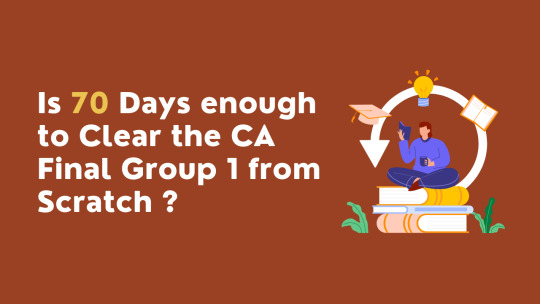
The Chartered Accountancy (CA) Final is one of the most challenging exams in the field of finance and accounting. Clearing CA Final Group 1 requires not only a solid understanding of complex concepts but also the ability to apply them in various scenarios. If you’re starting from scratch with just 70 days to prepare, the task might seem daunting, but it is not impossible. With the right strategy, focus, and discipline, you can significantly improve your chances of success. One valuable resource to consider during your preparation is using Scanner CA Final books. These books can help you identify important topics and frequently asked questions, providing a targeted approach to your study plan.
1. Understand the Syllabus and Prioritize
The first step is to thoroughly understand the syllabus for CA Final Group 1. The group covers four key subjects:
Financial Reporting
Strategic Financial Management (SFM)
Advanced Auditing and Professional Ethics
Corporate and Economic Laws
Given the vastness of the syllabus, it's essential to prioritize topics based on their weightage in the exam. Focus on high-scoring areas first, ensuring that you cover essential topics that are likely to appear in the exam. Create a study plan that allocates sufficient time to each subject, with more time dedicated to complex topics.
2. Create a Detailed Study Plan
A well-structured study plan is crucial when you have limited time. Break down the 70 days into weeks and further into days, assigning specific topics and chapters to each day. Ensure that your plan includes time for revision and practice exams. A suggested plan might look like this:
Focus: Core Subjects Overview
Day 1-2: Review Subject 1 - Read through main topics and key chapters.
Day 3-4: Practice questions from the CA Final scanner for Subject 1.
Day 5-6: Review Subject 2 - Focus on important chapters and concepts.
Day 7: Practice questions from the CA Final scanner for Subject 2.
Weeks 3-4:
Focus: Deep Dive into Subjects
Day 8-10: Study Subject 1 in detail - Major topics and past papers.
Day 11-13: Practice questions from the CA Final scanner for Subject 1.
Day 14: Revision of Subject 1.
Day 15-17: Study Subject 2 in detail - Major topics and past papers.
Day 18-20: Practice questions from the CA Final scanner for Subject 2.
Day 21: Revision of Subject 2.
Weeks 5-6:
Focus: New Subjects and Integration
Day 22-24: Study Subject 3 - Main topics and key areas.
Day 25-27: Practice questions from the CA Final scanner for Subject 3.
Day 28: Revision of Subject 3.
Day 29-31: Study Subject 4 - Major topics and focus areas.
Day 32-34: Practice questions from the CA Final scanner for Subject 4.
Day 35: Revision of Subject 4.
Weeks 7-8:
Focus: Mock Exams and Revision
Day 36-38: Take mock exams for Subjects 1 and 2.
Day 39-40: Review and analyze mock exam results for Subjects 1 and 2.
Day 41-43: Take mock exams for Subjects 3 and 4.
Day 44-45: Review and analyze mock exam results for Subjects 3 and 4.
Weeks 9-10:
Focus: Final Revision and Exam Strategy
Day 46-48: Revise all subjects with a focus on weaker areas.
Day 49-51: Final practice with CA Final scanner questions for all subjects.
Day 52-53: Take full-length mock exams and analyze results.
Day 54-56: Adjust study focus based on mock exam results.
Weeks 11-10:
Focus: Final Preparation
Day 57-59: Intensive revision of key topics and weak areas.
Day 60-62: Review important formulas, concepts, and CA Final scanner summaries.
Day 63-65: Take final mock exams to gauge preparedness.
Day 66-68: Review mock exam results and refine strategy.
Day 69-70: Relax and ensure you’re well-rested for the exam day.
3. Focus on Conceptual Clarity
Starting from scratch means you need to build your foundation quickly. Focus on understanding the concepts rather than rote memorization. CA exams test your ability to apply knowledge, so ensure that you grasp the underlying principles of each topic. Use study materials, reference books, online resources, and CA Final scanner to aid your understanding. If you come across any difficult concepts, don’t hesitate to seek help from peers, mentors, or online forums.
4. Practice, Practice, Practice
Practicing problems and case studies is crucial to reinforce your learning with the right study material for CA. Dedicate time each day to solve problems, especially in subjects like Financial Reporting and SFM. For auditing and law, practice writing answers to theoretical questions, focusing on structuring your answers clearly and concisely. Additionally, take timed mock tests using comprehensive study CA to simulate the exam environment and improve your time management skills.
5. Maintain Discipline and Stay Positive
With only 70 days at your disposal, discipline is key. Stick to your study plan religiously, avoid distractions, and maintain a consistent study routine. It’s easy to get overwhelmed, but staying positive and confident in your abilities is essential. Utilize recommended books for the CA exam
to ensure you cover all necessary material. Take short breaks to recharge, but ensure they don't derail your focus.
6. Revise Regularly
Revision is critical in the final weeks leading up to the CA entrance exam. Make sure you revisit important topics from your CA entrance exam books multiple times and practice recalling information without looking at your notes. Summarize key points from these books and create quick reference sheets for last-minute revision.
Conclusion
While 70 days is a tight timeline to prepare for CA Final Group 1 from scratch, it’s not an impossible task. Success will depend on how effectively you manage your time, the clarity of your concepts, and the amount of practice you put in. By following a disciplined approach and staying focused on your goal, you can maximize your chances of clearing the exam. Remember, perseverance and determination are just as important as your study strategy. Good luck!
#scanner ca intermediate books#books for ca exam#study material for ca#Scanner CA Final books#CA Final Scanner
0 notes